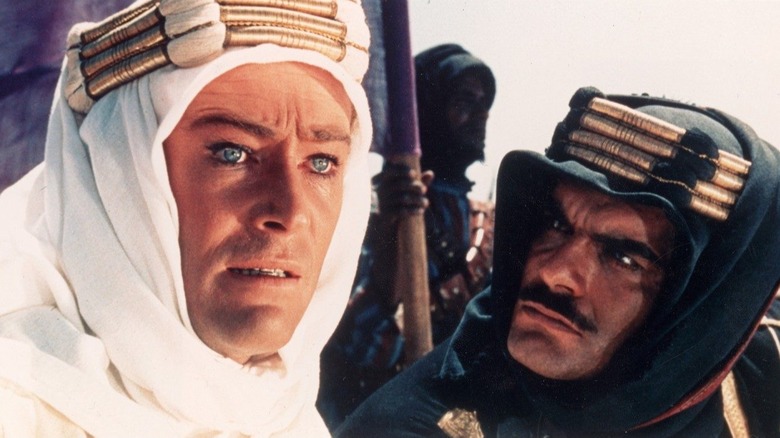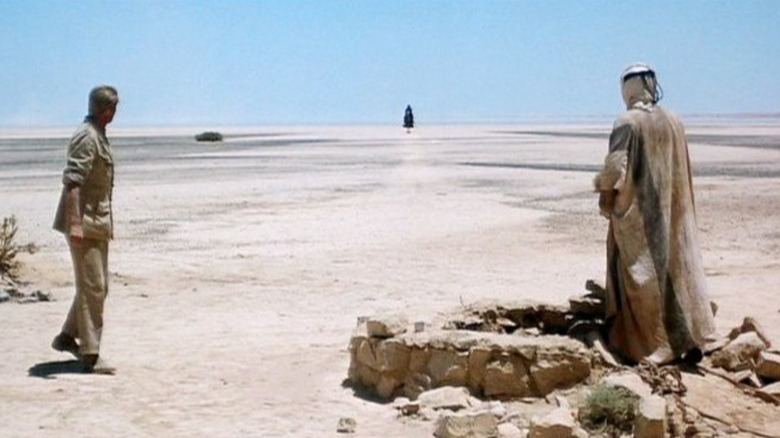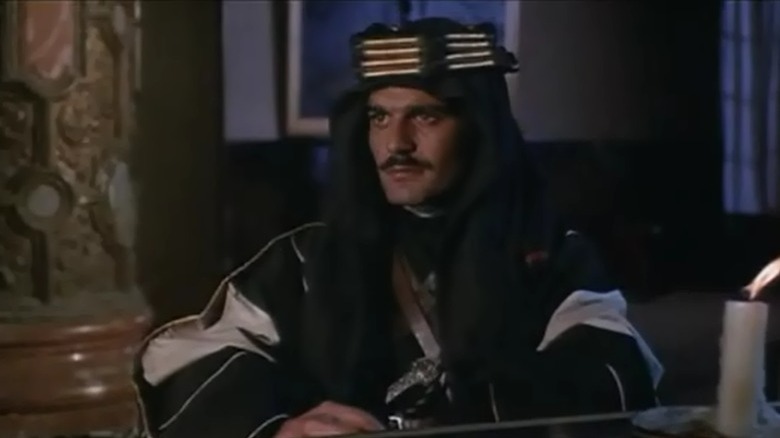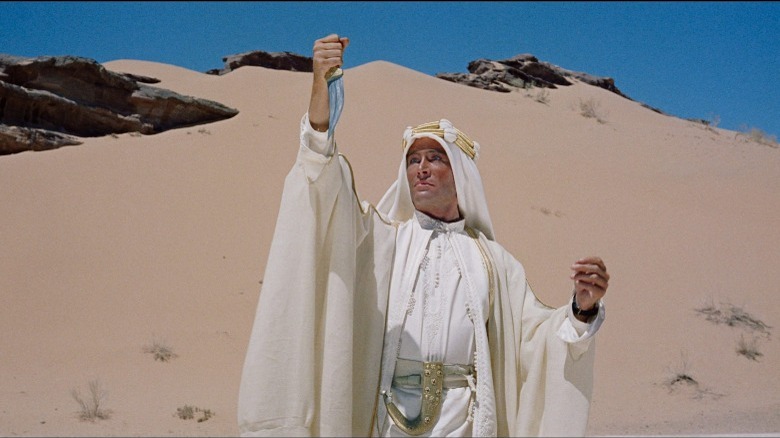Lawrence Of Arabia Ending Explained: Barbarous And Cruel
"Lawrence of Arabia" begins and ends with a question. Like "Citizen Kane," it opens with the death of its lead character, and various characters asking what made the great man who he was. When T.E. Lawrence (Peter O'Toole) dies in a pathetic motorcycle incident on the English countryside, a hard cut from his goggles hanging off a branch to a bust at St. Paul's Cathedral marks the first indication of his importance.
It soon becomes apparent that none of the distinguished British gentlemen at his funeral feel pride in having known him, alluding only vaguely to work he did in Cairo and Damascus. Early in Lawrence's funeral, the movie jumps back 20 years in the past to Cairo, the origin point of his heroism, showing Lawrence jockeying for a mission to find Feisal (Alec Guinness), an Arab Prince fighting the Turks.
David Lean's magisterial epic, about a British officer inserting himself into the Middle Eastern theater of World War I, uses the complex historical figure at its center to interrogate colonialism and white saviors. Like Lean's previous film, "Bridge on the River Kwai," it questions the presumed glory of the British Empire. The use of brownface on Alec Guinness and the paternalistic tendencies of its hero complicate the questions.
Deserts and desolate places
As Prince Feisal says, "The English have a great hunger for desolate places." The desert of the film is empty and alienating, blisteringly hot, and devoid of life outside of the primary drama. It's in the desert on the way to Feisal that Lawrence meets Sherif Ali (Omar Sharif), who kills Lawrence's traveling companion for drinking from his well. Ali's entrance, from a speck in the distance to human being, uses the vastness of the setting to convey its high danger. The threat of sandstorms and random violence turns the open spaces into prisons.
Lawrence tells Ali that unless the Arabs are willing to grow, they will continue to be "a silly people ... greedy, barbarous, and cruel." Lawrence's idea of the people he's ostensibly helping grows, but those words linger in the viewer's memory, quoted again and again by the Arab characters, eventually used against him.
Lawrence convinces Feisal to lend 50 men for a land attack on the port town of Aqaba, knowing that its location by the sea would make it valuable for the British. Because of its location, the only defense is on the shore, with nothing on the landward side of town, surrounded as it is by the unforgiving Nefud Desert. Ali, an associate of Feisal, doubts that the desert can be crossed, but makes the journey anyway.
Lawrence and Ali
Ali and Lawrence's relationship is exceptionally complex, beginning with distrust when Ali attempts to break him down as they travel across the desert, calling him an "English blasphemer." It moves to a grudging respect when Lawrence rescues one of Ali's men. Lawrence is gifted honorary robes. Ultimately, the two become friends, comrades in arms. They are equals, young and brilliant warriors on the same side of a difficult campaign, but the fundamental difference between them comes down to Lawrence's true intentions, if he fights for the Arab tribes or for himself. While Lawrence would eventually claim to be "of Arabia," Ali actually is. That he is one of the movie's fictional composite characters makes no difference — Sharif gives him wounded dignity and a vivid sense of honor throughout the movie, becoming its most touching character by the end.
As the two approach Howeitat leader Auda abu Tayi (Anthony Quinn) for help against the Turks, there's in-fighting among the groups: an old blood feud leads to a killing by one of Ali's men, and the only way for Lawrence to earn the Howeitats' trust is to kill the assailant, the same man Lawrence rescued earlier. With Auda's help, the group easily sacks Aqaba via land, an incredible, epic setpiece, and Lawrence is promoted to Major.
Undercutting the hero
The exciting hero's journey feel of the first half of the movie centers on Lawrence's ascension, and gives way to cynicism in the second half, as the reality of the war grows more endlessly destructive. There's back-and-forth fights between the Arabs and the Turks across the territory, and an excellent scene of Lawrence blowing up trains is soon followed with him taken prisoner in the city of Deraa and assaulted by the Turkish Bey (Jose Ferrar, who would cite the performance as a personal favorite despite limited screentime).
Despite being personally shaken by the experience in Deraa, Lawrence is persuaded by General Allenby (Jack Hawkins) to fight again, this time in Damascus, leading a mercenary army to commit a great slaughter on the Turks as retaliation. Ali fights to prevent it, but fails, and Lawrence is forced to live in its shadow, knowing the extent of his own bloodthirst and feeling his closest relationship break down.
Damascus is established as a British stronghold, and tension between the Arab tribesmen reaches a fever pitch. Lawrence, abandoned by Ali, becomes a lonely figure in the wake of the slaughter, and prays to never see the desert again. Having given up the desert robes, he changes back to an officer's uniform. On the road from Damascus, a motorcycle crosses his path, reminding us of the movie's opening and the eventual endpoint of all Lawrence's striving.



